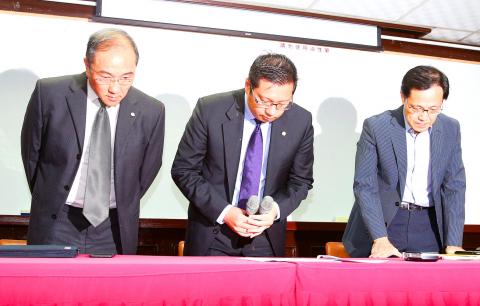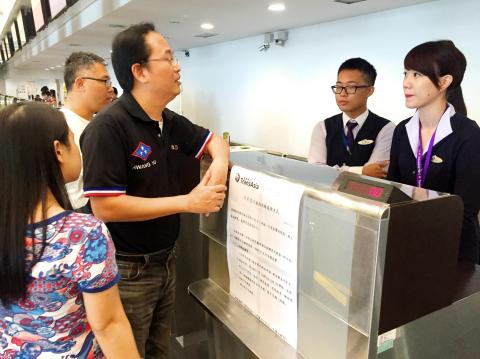TransAsia Airways Corp (復興航空) yesterday said it is to dissolve the company after its attempts to keep it afloat failed.
The company looked at options, including a sale, restructuring and capital injections, during three meetings between its board of directors and industry experts, TransAsia Airways chief executive officer Liu Tung-ming (劉東明) told a news conference at the Taiwan Stock Exchange.
“Despite our best efforts to devise a new business model, the company could not produce an effective turnaround plan to repair its deteriorating finances,” Liu said.

Photo: CNA
The airline said it is unable to repay US$75 million in European convertible bonds due on Tuesday next week.
The company’s net worth was estimated at about NT$5.44 billion (US$170.29 million), or a book value of NT$7.17 per share, as of the end of last month, TransAsia vice president Chen I-chieh (陳逸潔) said.
The airline operated 27 routes in Taiwan, China and the rest of Asia, each representing about a third of total sales, Chen said.

Photo: Lee Chung-hsien, Taipei Times
In the first three quarters, the company racked up losses of NT$2.2 billion, Liu said.
TransAsia chairman Vincent Lin (林明昇) blamed the declining number of Chinese visitors, as well as rising fuel prices and a strengthening US dollar, for the company’s steep losses.
TransAsia’s load factor had fallen to about 60 percent, which was well below its domestic peers’ and unsustainable, Lin said.
TransAsia shares are to resume trading today following yesterday’s suspension, but trading would be conducted on a full-cash delivery basis, the Financial Supervisory Commission (FSC) said.
At a news conference held jointly with the heads of government agencies yesterday, the Cabinet said that the impact of the airline’s closure would be limited and the company has enough cash to refund customers and cover severance pay.
An estimated 100,000 travelers are affected by the unexpected folding of the nation’s first commercial airline, but other carriers have capacity to take on passengers booked to fly with TransAsia as it is the off-season, Civil Aeronautics Administration (CAA) Air Transport Division director Han Chen-hua (韓振華) said.
TransAsia has created a trust fund to ensure that customers get a full refund on booked flights, and the company will not dismiss ticketing and customer service staff until Dec. 20, so that they can assist in the transfer of passengers to other airlines, the firm said.
The CAA formed a special task force immediately after TransAsia announced a temporary suspension of operations on Monday to ensure that travelers’ rights are protected, Fan said.
The CAA is to impose a fine of between NT$600,000 and NT$3 million on TransAsia for halting flights without seeking prior approval.
The CAA has conducted regular financial inspections on TransAsia, and the company still holds more than NT$1 billion in cash and is not facing an immediate financial crisis, Han said.
TransAsia has 1,735 employees and they are covered by labor insurance, while there is NT$310 million in the company’s pension fund account, Deputy Minister of Labor Kuo Kuo-wen (郭國文) said.
“The money is more than enough to pay employees’ pensions and the remaining amount can be used to cover severance pay,” Kuo said.
The FSC and prosecutors have launched an inspection into possible insider trading in the company’s shares, and it has yet to be determined whether company executives were involved, commission vice chairman Huang Tien-mu (黃天牧) said.
The Taiwan Stock Exchange on Aug. 15 listed TransAsia as financially unstable, to warn investors of the risk involved in trading the company’s shares, Huang said.

ACTION PLAN: Taiwan would expand procurement from the US and encourage more companies to invest in the US to deepen bilateral cooperation, Lai said The government would not impose reciprocal tariffs in retaliation against US levies, President William Lai (賴清德) said yesterday, as he announced five strategies to address the issue, including pledging to increase Taiwanese companies’ investments in the US. Lai has in the past few days met with administrative and national security officials, as well as representatives from various industries, to explore countermeasures after US President Donald Trump on Wednesday last week announced a 32 percent duty on Taiwanese imports. In a video released yesterday evening, Lai said that Taiwan would not retaliate against the US with higher tariffs and Taiwanese companies’ commitments to

‘SPECIAL CHANNEL’: Taipei’s most important tasks are to stabilize industries affected by Trump’s trade tariffs and keep negotiations with Washington open, a source said National Security Council Secretary-General Joseph Wu (吳釗燮) arrived in the US for talks with US President Donald Trump’s administration, a source familiar with the matter said on Friday. Wu was leading a delegation for a meeting known as the “special channel,” the Financial Times reported earlier. It marked Trump’s first use of the channel since returning to the White House on Jan. 20. Citing a source familiar with the matter, the Financial Times reported that Minister of Foreign Affairs Lin Chia-lung (林佳龍) was also a part of the delegation. The visit came days after China concluded war games around Taiwan and amid Trump’s

Intelligence agents have recorded 510,000 instances of “controversial information” being spread online by the Chinese Communist Party (CCP) so far this year, the National Security Bureau (NSB) said in a report yesterday, as it warned of artificial intelligence (AI) being employed to generate destabilizing misinformation. The bureau submitted a written report to the Legislative Yuan in preparation for National Security Bureau Director-General Tsai Ming-yen’s (蔡明彥) appearance before the Foreign Affairs and National Defense Committee today. The CCP has been using cognitive warfare to divide Taiwanese society by commenting on controversial issues such as Taiwan Semiconductor Manufacturing Co’s (TSMC, 台積電) investments in the

HELPING HAND: The steering committee of the National Stabilization Fund is expected to hold a meeting to discuss how and when to utilize the fund to help buffer the sell-off The TAIEX plunged 2,065.87 points, or 9.7 percent, to close at 19,232.35 yesterday, the highest single-day percentage loss on record, as investors braced for US President Donald Trump’s tariffs after an extended holiday weekend. Amid the pessimistic atmosphere, 945 listed companies led by large-cap stocks — including Taiwan Semiconductor Manufacturing Co (TSMC, 台積電), Hon Hai Precision Industry Co (鴻海精密) and Largan Precision Co (大立光) — fell by the daily maximum of 10 percent at the close, Taiwan Stock Exchange data showed. The number of listed companies ending limit-down set a new record, the exchange said. The TAIEX plunged by daily maxiumu in just